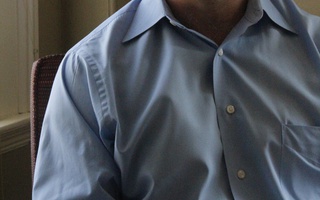Thousands of essays, journals, and other archival documents from the 17th and 18th centuries are now available online, after a group of Harvard libraries launched the Colonial North American Project website last week.
The launch is part of a broader push to digitize the archives in the library system. The Law School library recently announced an effort to digitize its collection of United States case law, and the Harvard-wide library system is conducting a fundraising campaign to support digitization projects among other efforts. {shortcode-9683a66884a6192bb52e74f4c693527a9783fca5}
Material in the Colonial North American Project comes from repositories including the Houghton Library and the Harvard University Archives. In addition to addressing daily life, the documents also reflect the “origins of the United States” and “aspects of life and work in Great Britain, France, Canada, the Caribbean, and Mexico,” according to the project website.
Diana D. Loren, the director of academic partnerships and museum curator at the Peabody Museum, spoke at a panel presentation for the Colonial North American Project last week. She discussed the Harvard Yard Archaeology Project—a dig she co-administers every other year in front of Matthews Hall—and the value of studying history with both archival documents and artifacts at hand.
“It’s amazing,” Loren said. “The way we can access those documents, not only the curators but the students.”
Loren said she has made use of digitized documents in researching colonial Harvard history.
“Being able to look at some of those early documents to find out more about the state of the University, the state of the College, the state of the students—that’s an incredible boon for us,” Loren said. “And there’s stuff coming to life that we haven’t seen before.”
English professor Amanda Claybaugh said she could only find documents by word of mouth when writing her most recent book, and she wished she had had access to such a database, as it would have made her research far more efficient.
Claybaugh cautioned, however, that physical documents should still be archived even after they are digitized in case the digital file becomes corrupted.
“I think it’s hugely important, and for most professors it will be very transformative,” Claybaugh said. “Before digitization of such archives, we weren’t able to do comprehensive analyses like those possible in the social sciences.”Read more in University News
Researchers Find Increase in Prescription Drug UseRecommended Articles
-
Declassified KGB Files Come to LamontHarvard students interested in the inner-workings of the KGB or the last days of Stalin now have an invaluable new
-
Professor Taussig's Collection of Tariff Documents.If we only had more Professor Taussigs and more little volumes like his "State Papers and Speeches on the Tariff,"
-
Harvard Tariff Reform Association.[By accident the second of these resolutions was omitted in yesterday's issue.- EDS. CRIMSON.] At a meeting of thirty men
-
Harvard Art Museums Open Archives to PublicOn Monday, visitors to the Harvard Arts Museums got a rare peek into the usually closed archives of past exhibits during "Archives Open Hours."
-
 We The Petitioners: Rewriting the History of Massachusetts's Native Americans
We The Petitioners: Rewriting the History of Massachusetts's Native Americans













